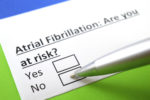A normal heart beats between 60 and 100 per minute when resting. Atrial Fibrillation is a condition which can increase the heartbeat to over 140 beats per minute. These beats are likely to be irregular. In the heart of someone with this condition, the upper chambers of the heart (called Atria) contract randomly and so […]
Recognising a Stroke
Early identification of stroke symptoms can significantly impact the effectiveness of treatment. The acronym FAST is a helpful tool:
- Face: Observe for facial drooping on one side, such as an uneven smile.
- Arms: Check if the person can raise both arms or if one drifts downward.
- Speech: Listen for slurred or strange speech.
- Time: If any of these signs are present, call emergency services immediately.
Additional symptoms may include sudden confusion, vision problems, dizziness, loss of balance, or a severe headache with no known cause.
Immediate First Aid Response
If you suspect someone is having a stroke:
- Call Emergency Services: Dial 999 immediately.
- Keep the Person Comfortable: Help them sit or lie down in a safe position.
- Monitor Vital Signs: Observe their breathing and consciousness level.
- Do Not Give Food or Drink: This reduces the risk of choking.
- Be Prepared for CPR: If the person becomes unresponsive and is not breathing, begin CPR.
For guidance on performing CPR, refer to our Adult CPR page.
Understanding Cerebral Compression
Cerebral compression occurs when there is increased pressure on the brain due to swelling or bleeding, often resulting from a stroke or head injury. This condition is a medical emergency.
Signs include severe headache, vomiting, unequal pupil sizes, and decreased consciousness.
Learn more about cerebral compression and its management on our Cerebral Compression page.
Preventive Measures
Reducing the risk of stroke involves managing lifestyle and health factors:
- Maintain a Healthy Diet: Consume a balanced diet rich in fruits, vegetables, and whole grains.
- Engage in Regular Exercise: Aim for at least 150 minutes of moderate aerobic activity weekly.
- Avoid Smoking and Limit Alcohol Intake: These habits can increase stroke risk.
- Monitor Blood Pressure: Regular checks can help manage hypertension, a significant risk factor.
- Manage Chronic Conditions: Proper control of diabetes and cholesterol levels is essential.
For more information on stroke prevention, visit the Stroke section of our website.
Further Resources
Expand your knowledge on related topics:
For comprehensive first aid training, enrol in our First Aid at Work Annual Refresher (VTQ) course.


